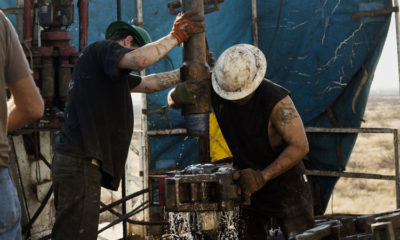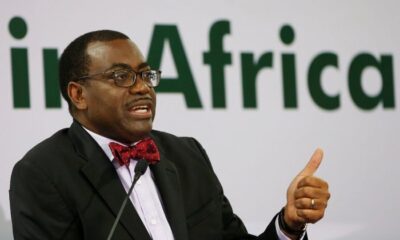Economy
‘2016, The Worst Year For Port Operations’
Published
8 years agoon

- Ship Owners Tagged 2016, The Worst Year For Port Operations
With only a few days into 2017, maritime operators including seaport operators, clearing agents and all stakeholders are unanimous in their assessment that the outgoing year has been the most challenging and one that will linger in their mind for a long time to come.
They attributed these challenges to many of what they described as Federal Government’s unfavourable policies, a development that saw the seaports, which used to contribute a large chunk of Nigeria’s non-oil revenue becoming less active.
This left government almost financially stranded, with less capacity to invest in infrastructure, create more jobs, address security, including fighting insurgency, and funding other activities that define good governance.
Recent statistics from Nigerian Ports Authority (NPA), which governs and operates the nation’s ports showed that container traffic inward Nigerian ports (import) dropped to 6,831,348 tonnage as at September 2016, from 9,419,672 in 2015. Besides, the outward container (export) also dropped drastically from 2,263,594 tonnage in 2015 to 1,485,338 in September 2016.
Also, the number of vessels dropped to 11year lows and stood at 3,347 against 5,014 in 2015 and 5,333 in 2014.
The Guardian gathered that importation of raw materials has also dropped significantly, as importers argued that lack of access to foreign exchange and low patronage was killing their business.
Many of the terminal operators are groaning under poor handling of goods, while many of them are finding it difficult to meet their payment obligations to the Federal Government.
As such, opinions are varied regarding the effect of government’s policy pronouncements during this fiscal year, while hoping that 2017 will turn out to be much more fruitful, as captured below:
Reduce tariffs to bolster ports activities, urges STOAN
The Spokesperson for Seaport Terminal Operators Association of Nigeria (STOAN), Bolaji Akinola, while declaring that Year 2016 has been a very difficult year for port operations, told The Guardian that government needs to reduce tariffs to boost activities.
According to him, “The ports have dried up. Usually at this time of the year (December), it will be difficult to get into Apapa or come out of it. But go to Apapa now, the whole place is as free as ever. This is the peak season, yet there is no traffic. No cargo movement. Everywhere is dried up and the main reason like we have said severally is government’s unfavourable policies.”
Such unfavourable policy is also seen in the National Automotive Policy, which he said has wiped out vehicle cargo traffic at the ports completely and almost decimated the roll-on, roll-off, RORO terminals in the country.
Akinola said: “The hike in import duty of vehicles; hike in rice duty has take away the rice cargo traffic, that is why you have some terminals like ENL Terminal drying up overnight. It’s a terminal that used to be very boisterous and very active, providing jobs for many people.”
He argued that although the ban on importation of vehicles through the land borders will take effect from January 1, 2017, but it will not be effective, as it will lead to increase in smuggling.
He insisted, “The ban will not be effective without a corresponding slash in vehicles tariffs. I am not trying to scare anyone, but that is the truth of the matter. It will only lead to high rate of smuggling. The only way to check smuggling right now is to accompany that ban with a slash in tariff so that you bring it to the same level as what obtains in the ports of Cotonou and other countries in the sub-region. Otherwise smuggling will be heightened.
“I will give you a practical illustration. Look at rice, importation of rice through the land border has been banned, yet there is no scarcity of imported rice in Nigeria today. Those imported rice you see in the market did not come in through the ports. You can go to the ports and check; you will not see rice vessel there. So how do they come in? They are smuggled in. The same thing will happen to the vehicles, so that is why the only way out is to slash the tariff to 10 per cent that it was, so that it will be at par with other ports in the sub-region,” he said
For Akinola, the final nail on the coffin is the “ill-advised” Central Bank of Nigeria (CBN), the lender of last resort, restriction of 41 items from the official forex window.
As the New Year is ushered in, he urged the government to look into these policies and reverse them, especially the CBN’s policy and the hike in tariff of imported vehicles.
Ports upgrade is a necessity
For Master Mariner, Captain Adamu Audu Biu, the upgrade of the nation’s ports must take a centre stage in the coming year, saying that Nigeria must rise up and develop its ports facilities. He said this will enable the country to accommodate very large crude carriers (VLCCs) and ultra large crude carriers (ULCCs), which are the latest trend in the global market now, if its desire of becoming the maritime hub in West Africa would be realistic.
Biu said: “Our ports and their approaches were last upgraded in the late seventies and early eighties. One must commend the efforts of some of the terminal operators since the concessioning of the ports. The depth of water available in all our port approaches, jetties and berths need to be significantly improved. Same is the case with the structural integrity of our quay aprons,” he said.
Ship owners upbeat about 2017
President of the Ship Owners Association of Nigeria (SOAN), Greg Ogbeifun, while agreeing that the industry did not do too well in the outgoing year, expressed the hope for better performance in 2017.
In a chart with The Guardian, he insisted that the industry recorded some achievements in 2016, without giving further details, noting that the stakeholders’ forum organised by the Ministry of Transport, further brightened the hope for a better industry in 2017.
“I must say some salient challenges are still there. It’s one thing to come with good policy it is another thing to be able to implement it. If you don’t have more knowledgeable people in the right positions to implement the policies then you cannot achieve what you set out to achieve,” he said.
He appreciated the minister’s determination to resuscitate Nigerian flag flying ships to ply the nation’s waters with the attendant benefits of job creation and training activities for cadet officers.
“In the area of regulation, there is a lot to be done. I don’t think the regulatory agencies are doing much. The fundamental reason for that is that apart from the fact that people that are being appointed to certain positions don’t seem to be knowledgeable enough, there hasn’t been enough stakeholders’ engagement,” he said.
In 2017, the SOAN president said the government should review some of the extant laws and policies including taxes so as to increase the emergence of Nigerian fleets; while issues of human capacity development should be taken serious.
“We must look inward now to grow our ability to build maritime capacity, making use of the maritime institutions that we have in-country. We should stop going out looking for places in Malaysia, India or Philippines. Let us develop our own institutions to meet these standards and it can be done.
“The Maritime Academy, Oron, has a very strong and basic infrastructure that can be built upon, the software can be improved, employ the right calibre of teaching staff. Nigeria has no reason to be sending cadets out of this country to look for schools or ships, when we have thousands of them here in Nigeria.
“Also, Institute of Oceanography has many potential that has not been tapped, so, government should also look into that too. Government should listen to the ship owners, because we have a lot of ideas and we are doing the job.
NPA promises facelift for Apapa roads in 2017
The Managing Director, NPA, Hadiza Bala Usman has promised that the dilapidated port access roads will be fixed in the coming year, as the Federal Ministry of Power, Works and Housing, has incorporated some of the projects in the 2017 budget.
Expressing commitment to make the port access road motorable again, Usman said: “On the ports access road, we have given timelines and deadlines to the respective agencies. On the Wharf Road, we have concluded discussion with Sanford and Flour Mills on mechanism to fixing the road, taking into consideration the need for drainage. The final draft will be submitted to the Ministry of Power, Works and Housing in four weeks, whereby the Ministry will conclude on the framework in which the road will be built. The Ministry will communicate the details to the public when they are ready.
“We have also discussed extensively and gotten the Creek Road and two other roads within Apapa into the 2017 budget by the Ministry of Power, Works and Housing, and they will be constructed within that period.”
Is the CEO and Founder of Investors King Limited. He is a seasoned foreign exchange research analyst and a published author on Yahoo Finance, Business Insider, Nasdaq, Entrepreneur.com, Investorplace, and other prominent platforms. With over two decades of experience in global financial markets, Olukoya is well-recognized in the industry.

You may like
-
Nigeria Joins BRICS as Partner Country, Strengthening Global South Cooperation
-
70 Million Poorest of The Poor Nigerians To Get N75,000 From FG
-
Nigeria Surpasses OPEC Quota with 1.51 Million bpd, Targets 2.06 Million in 2025
-
Global Investors Commit $7.6 Billion to Nigeria’s Development at AIF 2024
-
Nigeria-China Trade Strengthened as Grimaldi Introduces Direct Shipping Line
-
Nigeria’s GDP Records 3.46% Growth in Q3 Spurred by Non-Oil Sector













